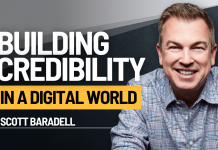Setting goals is crucial whether you’re looking to boost your performance, hit new targets, or stay motivated. However, many people set goals and don’t understand how follow through effectively to achieve them. In today’s episode of The Small Business Show, Matt Easton, sales coach and founder of Easton University, joins us to teach his fundamental rules for effective goal setting.
Rule #1: A want is not a goal
The first–and arguably the most important–rule is that simply wanting something is not a goal. Easton stresses that a want doesn’t truly become a goal until a tangible, measurable plan is created. The strong plan must have a solid framework and accountability measures in place.
Rule #2: Create strong goals
Often, we unintentionally allow others, such as our family members, spouses, or bosses, to dictate or impact the goals we set for ourselves. Typically, the bar for the goals others set for us is too low and usually doesn’t align with our deepest wishes.
Easton stresses the importance of taking the time to self-reflect. Visualize your ideal future and set solid, measurable, time-bound goals that will get you there. He also notes that it’s important not to separate personal and professional goals. They’re interconnected, and the wins and losses in both parts of your life will impact the other.
Rule #3: Create a roadmap for every single day
Motivation is not reliable and is often fleeting. While it can be the catalyst to jumpstart a process, it eventually will dwindle. The secret to achieving goals is to build discipline.
Easton recommends creating a personalized roadmap that breaks down large goals into smaller, actionable items. This daily roadmap is a snapshot of your day and will help keep you on track.
An effective roadmap should consist of:
Vision board
When you’re having a rough day, the vision board can serve as a pick-me-up to get you back on the right track. Fill your vision board with pictures of things that you will reward yourself with when you achieve your goals. The possibilities are endless, and great examples include: your dream car, a luxury watch, or a boat.
Theme
An excellent motivator is to assign a “theme” that coincides with your main objective for the season of life you’re in. Are you looking to continue growing on the path that you’re on, or are you pivoting in a new direction? Easton’s theme is “Curate 2025,” and his goal is to uncover what he truly wants and curate his life around those wants.
Visualization
Take a moment to visualize the future. Where do you see yourself in five, ten, fifteen years? What does it look like? Then, write down those goals as if you have already achieved them. It will help you visualize where you want to be and motivate you to continue pushing forward.
Daily tasks
The daily tasks section of your roadmap will break down larger goals into smaller, actionable items that can be completed daily. These tasks should always align with your overarching goal and must be repeatable and measurable.
Must-do tasks
In addition to your daily tasks, an effective roadmap should consist of non-negotiable “must-dos” for the day. These are slightly different from your daily to-dos, and are tasks that are of a much higher priority.
Push forward
Putting pen to paper and writing down goals can be life-changing, however, many people struggle to do so. Easton points out that the most common reason is that we’re filled with self-doubt and afraid we’ll disappoint ourselves if we fail. In some cases, we’re worried that others will mock us for our goals.
When sharing your goals, confide in others who genuinely support you. Family members and peers may unintentionally undercut your aspirations, saying things like, “I like you the way you are,” or joking, “You’re making us all look bad.”
If you want to make a change, you must stay focused on your goals and don’t let others’ opinions hold you back. The anxiety that we feel will be there regardless of whether we achieve our goals or not.
Go big, give yourself the sense of satisfaction that you’ve at least tried, and continue to push forward every day.
"Dream big, set a goal, write your goals down, and figure out what you have to do every day. You will either hit your goals faster than you thought you could or get really close." – Matt Easton







